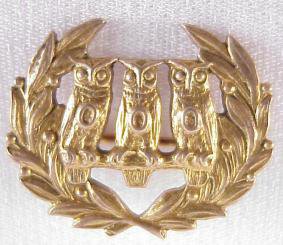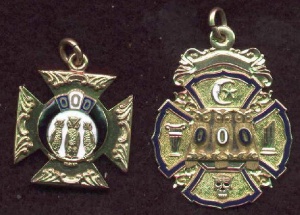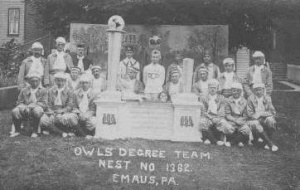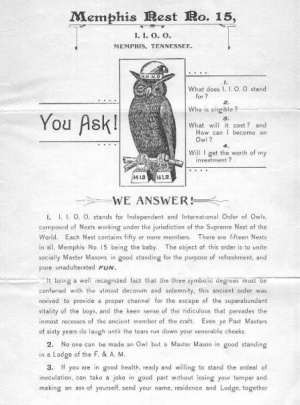En:Order of Owls
Order of Owls
Source: Phoenixmasonry
One of the smaller orders, now nearly extinct. The larger piece is 10K gold and both are new old stock. All Owl pieces are fairly rare. The below descriptions are taken from The Greenwood Encyclopedia of American Institutions "Fraternal Organizations" by Alvin J. Schmidt - Greenwood Press, Westport, Connecticut - London, England.
Owls, Independent International Order of. - This was a Masonically related group that organized itself in 1890 in St. Louis, Missouri. Its objectives were to promote recreation and sociability among the members. Only Master Masons were eligible to join. Its local units were called "Nests." The head officer of each nest was known as "Sapient Screecher." The national body was called "Supreme Nest of the World."
Owls, Order of (OOO). - South Bend, Indiana, was the city where this "animal" Lodge was born. John W. Talbot and a small group of his associates in November of 1904 formed this fraternal group. When it was founded, the order sought to assist its members in business and in employment, provide help to the widows and orphans of the deceased members, and to enjoy mutual fellowship with one another. This order has no relationship with the onetime Masonically related group, the Independent Order of Owls, that was organized in St. Louis, Missouri, in 1890.
The OOO has four degrees, plus the presence of a ritual, passwords, and fraternal grips. The ritual, as in most fraternal orders, is intended to be secret. The OOO publications (e.g., brochures) contend that its ritual has no religious elements. An older edition of the ritual states: "We advocate no creed. We know there are so many gods, so many creeds, so many paths that wind and wind. We believe that the art of being kind is all this world needs."
Membership has been open only to white males. During the early 1920s the OOO had over 600,000 members in 2,148 local Lodges, called "Nests." Since the 1920s, the order has been losing members rather significantly. Its 1979 membership roster has about 40,000 members.
Local units, as noted, are called "Nests." The national governing body is known as the "Supreme Nest." Its main officer is named "Supreme President."
Additional information may be gained by consulting William Whalen, Handbook of Secret Organizations, 1966; Arthur Preuss, A Dictionary of Secret and Other Societies, 1924. Back issues of the society's periodical, The Owl, are also helpful.




